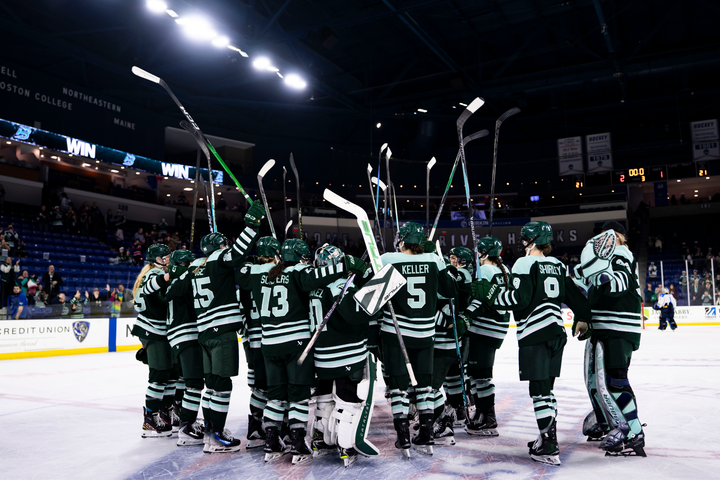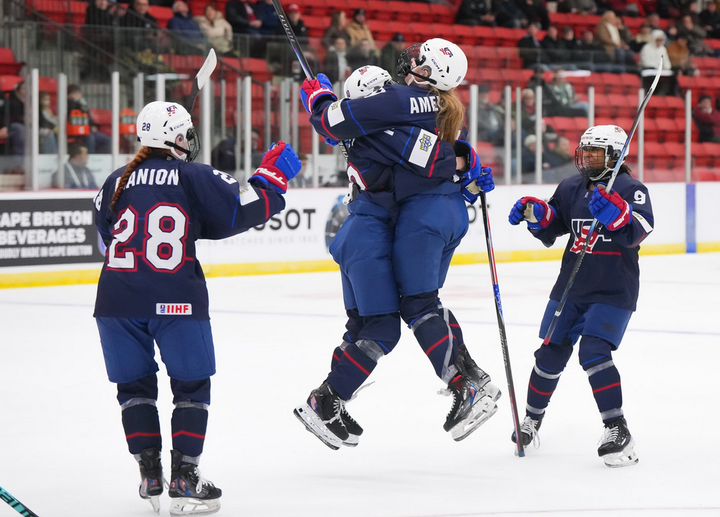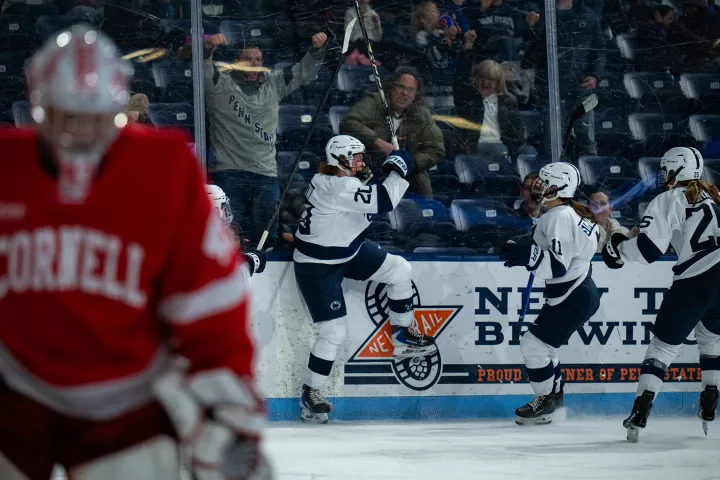Team USA’s All-Decade Team
A starting six representing the best of the best for the United States women’s national team
Over the last few weeks hockey publications covering men’s hockey and the NHL have been rolling out series of all-decade teams. We figured it was only appropriate to do the same but wanted to add a little twist. Instead of looking at all-decade teams for CWHL, NWHL, SDHL, or other professional teams, we are putting the spotlight on the best players to compete on national teams over the past decade.
The window we’ll be focusing on begins with the 2010 Olympics and ends with the 2019 IIHF Women’s World Championship. Because the Olympics and Worlds have far more significance than the Four Nations Tournament or the Rivalry Series, we are focusing exclusively on accomplishments achieved in those events.
Brianna Decker
- MVP of the 2017 Women’s World Championship
- Best Forward 2017 Women’s World Championship
- World Championship All-Star Team: 2015, 2017/
Decker, 28, is peerless in her role as a generator for scoring chances on the United States women’s national team. Team USA’s top center has been perpetually underrated despite the fact that her fingerprints are all over her championship victories in the NCAA, the NWHL, the CWHL, the Women’s Worlds, and the Olympics.
Decker has piled up nine points in 10 games at the Olympics and has averaged one assist per game (37 total) in Worlds competition since 2011 — in addition to potting 26 goals of her own. Her knack for moving the puck and making big plays has directly contributed to scores of goals for Team USA’s biggest goal scorers, namely Hilary Knight and Kendall Coyne Schofield. It’s also worth noting that she proved to the hockey world that she’s one of the best passers on the planet by besting the NHL’s All-Stars in a precision passing drill at the 2018 All-Star Skills competition.
One needs only watch a handful of games when Decker is in the lineup to appreciate why she is likely the team’s most valuable player. Her instincts away from the puck, especially in the neutral zone, simply don’t get enough attention or praise. She’s a true 200-foot player, but we rarely have an opportunity to celebrate her defensive acumen because she drives possession for Team USA. It seems that whenever Decker is on the ice, Team USA has the puck and they are going on the attack.
Snnnnnnnnnnnnnipe. Yep, @Bdecker14 is pretty damn good. Here is her game-tying goal for Team USA at the top of the 2nd period. Assists to Kendall Coyne Schofield and Sydney Brodt. pic.twitter.com/P9TSiyPxEw
— Mike Murphy (@DigDeepBSB) November 6, 2018
Hilary Knight
- MVP of the 2015 and 2016 Women’s World Championships
- World Championship Best Forward: 2015, 2016
- World Championship All-Star Team: 2011, 2015, 2016, 2019
- Media All-Star in the 2014 Olympics/
The face of women’s hockey for much of the past decade was a lock for this starting six. Knight is a premier power forward with a knack for scoring clutch goals and making big plays when the world is watching.
Since the 2011 Worlds, Knight leads all skaters in scoring with 64 points in 37 games. In that window, she has scored 36 goals in 37 games in Worlds competition, several of which are among the most significant goals in national team history. No other skater in the world is even in the same ballpark when it comes to goal scoring in Worlds competition over the past decade. In fact, we have to look back to Team USA icon and Hockey Hall of Famer Cammi Granato to find someone who scored goals at that pace — she had 44 goals in 43 games in Worlds competition.
What a shot. What a goal. What a game. What a talent: @Hilary_Knight. #TeamUSA is #2017WWC Champs! pic.twitter.com/TqI2OP0sTD
— NWHL (@NWHL) April 8, 2017
Knight is also Team USA’s highest-scoring skater in Olympic competition since the 2010 Olympic Games. Like Decker, she was a key figure in Team USA’s historic gold medal victory in PyeongChang for the 2018 Olympics, which was the first Olympic gold claimed by the national team since Granato and company set the bar for excellence in Nagano in 1998.
Kendall Coyne Schofield
- Best Forward 2019 Women’s World Championship
- World Championship All-Star Team: 2017, 2019/
Choosing between Meghan Duggan and Kendall Coyne Schofield for this final forward spot was no small task. Both on and off the ice, these two women have forever changed the game.
Coyne, 27, gets the edge because of the role she played in guiding Team USA to its first Olympic gold and because she’s been the greater scoring threat in both Worlds and Olympic competition. One can definitely make a case that Duggan was the more consummate captain, but Coyne was an offensive dynamo for Team USA over the past decade.
The fastest skater in women’s hockey is on par with Decker in terms of Olympic production — nine points in 10 games — and demonstrated a scoring touch that could rival Knight’s in the last few years of the decade. Coyne buried five goals in the 2017 and 2019 Worlds in addition to scoring two goals in five games at PyeongChang. We don’t have the data for it, but she’s also been responsible for numerous Team USA power plays as a result of her speed forcing teams to take costly penalties.
Monique Lamoureux-Morando
- Best Forward 2011 Women’s World Championship
- World Championship All-Star Team: 2012, 2015, 2016, 2017/
Although she has played both forward and defense for the national team, many of Monique Lamoureux’s greatest contributions to the national team have come from the blue line.
Monique made the World Championship All-Star Team as a defender in for three consecutive years (2015, 2016, 2017) after being named the top forward of the Worlds in the tournament. As you might imagine, no one else in the history of hockey has repeated that feat. When it comes to skaters who have played both on the blue line and as a forward, she is truly in a class of her own.
As a forward and defender, Monique notched 16 points in 15 games of Olympic competition during the past decade in addition to averaging 1.61 Pts/GP in Worlds tournaments. She and her twin sister Joceylne have been foundational pieces of Team USA’s success over the last ten years. Many forget that before Jocelyne scored the shootout-winning goal of the 2018 gold medal game in PyeongChang, it was Monique who tied the game up in the third period. She will undoubtedly have a place in the U.S. Hockey Hall of Fame after she hangs her skates up.
Monique Lamoureux-Morando gets her second goal of the tournament and the game is tied at two apiece. #PyeongChang2018 pic.twitter.com/Qj7GiNAhkO
— Steven Ellis (@StevenEllisTHN) February 22, 2018
Kacey Bellamy
Unlike the other four skaters on Team USA’s All-Decade Team, Bellamy does not have a small mountain of individual awards to her name. Her game has never been about making highlight reel plays, although she undoubtedly has the skills to make them. Instead, Bellamy has been responsible for providing the national team with superb two-way play as one of its elite defenders over the past decade and she has a trophy case filled with gold and silver to prove it.
Brianna Decker with the C goes up with Gigi Marvin and Hilary Knight before they motion for Kacey Bellamy to join them.
— Michelle Jay (@michelle_jay3) November 11, 2018
(Though the announcer man definitely thought Gigi was Kali Flannagan...) pic.twitter.com/iZ5iUUGIpk
Bellamy was a fixture of the national team in the past decade; a fierce competitor who burned her brightest against Team Canada. She and Gigi Marvin are the only two American defenders to play in all 15 of Team USA’s Olympic games since the Vancouver 2010. She’s also battled in the corners and in front of the net in 43 games of Worlds competition since the 2011 tournament, which gives her a commanding lead in games played among skaters who have exclusively played defense for the national team.
Jessie Vetter
It’s no secret that Team USA’s goalies tend to have a short shelf life. For most of the past decade, the national team’s coaching staff seemingly picked whichever goalie seemed to be the most on top of her game in each major tournament. Which is why Alex Cavallini (née Rigsby), who won Best Goaltender at the 2009 and 2010 Women’s World Junior Championships and was the first woman drafted into the USHL, has yet to play a single minute of Olympic hockey.
Looking back at the past decade, Jessie Vetter’s longevity and excellence are equally impressive. In Olympic and Worlds competition Vetter posted a record of 15–4–0 since the Vancouver Games and was Team USA’s first-string goalie in Vancouver and Sochi. Although she wasn’t part of the national team’s gold medal victory in PyeongChang, Vetter may be the closest thing to a workhorse starting goaltender the national team has had in the past 10 years.
Vetter posted a .958 Sv% (240 minutes) in Vancouver and a .907 Sv% (247 minutes) in Sochi. Despite the fact that she struggled in the 2015 Worlds and started in just one game at the 2016 Worlds, she had an exceptional career in the blue paint for the United States women’s national team and was at her peak at the start of the decade. There is definitely a case to be made for Cavallini, but the edge goes to Vetter because of the quality of her play in Vancouver and Sochi.
Honorable Mentions: Meghan Duggan, Alex Cavallini, Gigi Marvin, Jocelyne Lamoureux-Davidson, Kelli Stack
All data courtesy of IIHF.com, EliteProspects.com, teamusa.usahockey.com, and the author’s own tracking.





Comments ()